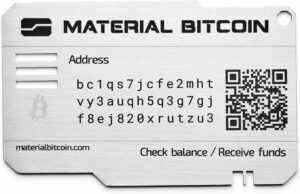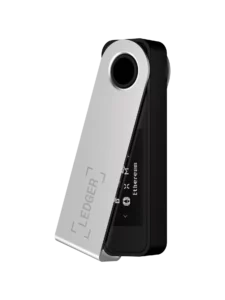With crypto showing no signs of slowing down, more and more people are finally beginning to take...

Here you will find everything about cryptocurrency wallets. From definitions that you’ll appreciate if you are a beginner in the crypto world, to recommendations and reviews of the most popular crypto wallets on the market. You’ll also learn about the differences between the types of crypto wallets that exist and which ones are best for you:
Highlighted articles:

With crypto showing no signs of slowing down, more and more people are finally beginning to take...

In today's digital realm, securing crypto assets is paramount. Enter the cold wallet card—an...

The TOKEN2049 isn't just another event; it's one of the most significant cryptocurrency events...
2024 is proving to be a great year for new technologies and digital assets, with BTC and the need for the best Bitcoin...
The first few months of 2024 have been nothing short of wild for Bitcoin. The value of BTC is on the up, and that is...
With Bitcoin on the up, there has been a lot of buzz about safeguarding crypto. Unfortunately, as the value of BTC...
No matter where you are in the world and whichever cryptocurrency you invest in, safeguarding your digital investments...
All over the world, crypto has boomed within the investment market, especially now that the SEC has approved its trade...
Emerging from the many crypto wallets available on the market, CryptoWallet.com is an interesting wallet option worth...
We have all heard about Bitcoin, tokens, and non-custodial investments. As the political volatility of the world...
Cryptocurrency has been in the mainstream news lately, with over 300+ million owners worldwide, the trading and...
Important: Before proceeding with this tutorial, make sure you have read and understood this Bitcoin and...
Think of it as your personal vault, but instead of holding physical cash, it safeguards your digital assets securely in the digital realm. Essentially, it’s a software program or a physical device that stores your private keys, allowing you to manage, send, and receive various cryptocurrencies.
Now, let’s talk about the different flavors of crypto wallets. There’s quite a variety out there, catering to different needs and preferences.
Cryptocurrency wallets serve as digital containers for storing, sending, and receiving cryptocurrencies. Here’s how they function:
Storing Cryptocurrencies:
Sending Cryptocurrencies:
Receiving Cryptocurrencies:
Public and Private Keys:
Blockchain Integration:
Material Bitcoin prioritizes security and durability, offering a tangible, fireproof, waterproof, and shockproof metal plate for storing BTC, Ether, and USDT. With self-custody and physical seed phrase storage options, it ensures long-term safeguarding of your crypto assets.

✅ Pros:
❌ Cons:
Exodus Wallet strikes a balance between accessibility and security, providing a user-friendly platform for trading cryptocurrencies directly within the wallet. While it offers convenience for beginners, it’s recommended to pair it with cold wallet storage for enhanced security.

✅ Pros:
❌ Cons:
Cryptowallet.com caters to mobile users with its intuitive app, allowing on-the-go management of over 800 cryptocurrencies. With real-time market data, news updates, and 24/7 customer support, it offers convenience but comes with a higher risk of cyber threats.

✅ Pros:
❌ Cons:
Ledger and Ellipal Titan are hardware wallets offering cold storage for cryptocurrencies. While Ledger integrates with various exchanges, Ellipal Titan provides air-gapped security for offline asset management. Both prioritize customer service and security, though they come with a higher initial investment cost.

✅ Pros:
❌ Cons:
Each type of wallet comes with its own set of pros and cons, so it’s essential to weigh your priorities—whether it’s security, convenience, or accessibility—before selecting the perfect crypto wallet for your needs.
When it comes to fortifying your crypto fortress, there’s nothing quite like the security offered by non-electronic hardware wallets. These analog marvels provide an extra layer of protection against the ever-evolving threats lurking in the digital realm.
By storing your private keys offline, away from potential online threats, non-electronic hardware wallets elevate crypto security to unparalleled heights.
Now, let’s delve into why non-electronic hardware wallets are the pinnacle of crypto security:
What is the purpose of a crypto wallet?
What are the different types of crypto wallets available?
How do hardware wallets differ from software wallets?
Can I have multiple cryptocurrency wallets?
What happens if I lose access to my cryptocurrency wallet?
Are crypto wallets backups of keys secure?